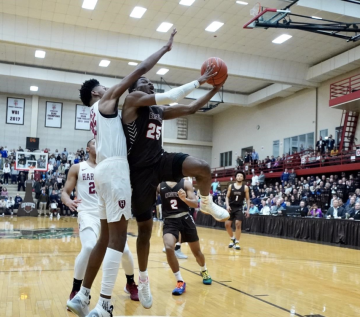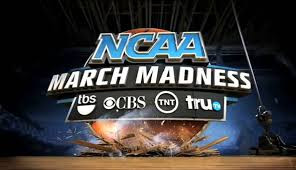Brown Basketball Players File Federal Lawsuit Alleging Price Fixing by Ivy League
Wednesday, March 08, 2023
Two Brown basketball players are the lead plaintiffs in a federal lawsuit that alleges that the eight Ivy League Universities have been price fixing, as it relates to financial aid packages as none of the elite schools offer athletic scholarships.
The 64-page lawsuit filed on Tuesday in federal court in Connecticut states, “This action arises out of Defendants’ ongoing price-fixing agreement (the “Ivy League Agreement”), in violation of Section 1 of the Sherman Act not to provide athletic scholarships to their Division I athletes (“Ivy League Athletes”) and not to pay Ivy League Athletes any compensation (or reimbursement of education-related expenses) for the athletic services they provide to the University Defendants."
The eight schools have combined endowments in excess of $170 billion.
GET THE LATEST BREAKING NEWS HERE -- SIGN UP FOR GOLOCAL FREE DAILY EBLASTForbes projected that by 2048 these endowments will collectively exceed $1 trillion. And the suit could be worth tens of millions or even hundreds of millions for the athletes.
“Plaintiffs bring suit on behalf of a proposed Class of all Ivy League Athletes recruited to play a sport by one or more University Defendants," according to the suit.
The two lead plaintiffs are accomplished Brown basketball players — Tamenang Choh, a star on the men’s basketball team who graduated last year, and Grace Kirk, a Brown women’s team member and presently a Brown student.
Choh was a three-time all-Ivy player and an all-academic selection.
Kirk plays in the regular rotation for the Brown women.
The suit is brought on behalf of all the athletes who have played at the Ivy League schools since 2019 — the so-called "class period."
Price Fixing
"The suit alleges that Defendants -- the Ivy League schools' -- price-fixing agreement is per se illegal. It is a naked restraint of trade among horizontal competitors. The Ivy League Agreement has direct anticompetitive effects, raising the net price of education that Ivy League Athletes pay and suppressing compensation for the athletic services they provide to the University Defendants. Absent the Ivy League Agreement, these schools would determine unilaterally, and in competition with each other, how many athletic scholarships to provide, by sport, and in what amounts, and how much to compensate (either directly or through reimbursement of tuition, room, and board, or both) for athletic services.”
And, the suit specifically outlines that the Ivy League is subject to anti-trust laws.
“The Ivy League Agreement is governed by the antitrust laws. The University Defendants operate as commercial enterprises, with each employing over 100 individuals in its athletic department or in positions relating to inter-collegiate athletic competition. The Council, the governing body of the Ivy League, coordinates the common rules, procedures, and initiatives among the University Defendants, including by setting the rules they must follow as part of the Ivy League athletic conference. The Council thus creates and enforces the rules the University Defendants agree to follow under the Ivy League Agreement,” states the suit.
The suit also makes the distinction between the Ivy League’s alleged collusion and other top-tier academic schools.
“The Ivy League Agreement is not necessary, for example, for the University Defendants to preserve the unique nature of Ivy League athletics, where academic excellence is paramount. Other academically selective universities—such as Stanford University, Duke University, the University of Notre Dame, and Rice University—award athletic scholarships and compensate/reimburse their athletes up to the limits the Supreme Court and the NCAA have allowed. These schools are not part of the Ivy League, but they demonstrate they can maintain stellar academic standards while competing for excellent athletes, and without agreed upon limits on price.”
Courts Have Taken Action Against Anti-Trust Behavior in College Sports
The class action suit cites that the courts have been tearing down the anti-trust behaviors that had dominated college sports for decades.
“On June 30, 2021, in the wake of Alston, the NCAA formally acknowledged that all “incoming and current” collegiate athletes, in all NCAA Divisions, are free to license NIL rights. The money that collegiate athletes earn from their NIL rights, albeit from third parties, is a further recognition of their athletic prowess, their contributions, and their value—and Defendants have adopted the NCAA’s NIL policy. Defendants have thus recognized that Ivy League Athletes provide valuable athletic services to the institutions they attend and for which these athletes compete. Defendants have thereby conceded, through their NIL policies, the right of these athletes to benefit from market competition. Yet the Ivy League Agreement limits such competition," according to the lawsuit.
Suit Claims Economic Damages — Athletes Forced to Borrow Tens of Thousands of Dollars
The suit also claims that even for those that receive need-based financial aid there are substantial additional costs.
"The Ivy League Agreement has caused and is causing substantial antitrust injury to Plaintiffs and the other members of the proposed Class. The University Defendants are among the most expensive undergraduate institutions in the country, with “sticker” prices for tuition, room, board, and incidental expenses—the full cost of attendance—exceeding $80,000 annually. The need-based financial aid that the University Defendants tout does not even cover the full cost of attendance for those who qualify, often amounting to a shortfall of thousands of dollars each year," according to the suit.
"As a result, even with the opportunity to obtain need-based financial aid, recruited athletes frequently need to pay (or borrow) many thousands of dollars a year, which is especially onerous for athletes from lower-income families. The Ivy League Agreement, in short, has stymied competition that would have lowered and would lower the net cost of attendance for the Class Members," the suit continues.
According to the lawsuit:
Choh’s Brown Package — Brown recruited, accepted, and enrolled Choh, providing him need-based financial aid, which did not cover the full cost of his tuition, room, and board, and incidental expenses. During his years playing basketball at Brown, Choh advanced from being a role player into one of the top starters on the team during his last three years. But for the Ivy League Agreement, Brown would have awarded Choh a full athletic scholarship and compensated/reimbursed him for the athletic services he provided to Brown. Choh is now playing professional basketball in Europe.
Kirk’s Brown Package — Plaintiff Grace Kirk, a resident of Duluth, Minnesota, is attending Brown. She is a junior. Kirk was recruited to play women’s basketball by multiple Division I colleges and was offered a full athletic scholarship from one of them. Brown recruited, accepted, and enrolled Kirk, providing her need-based financial aid, which did not cover the full cost of her tuition, room, and board, and incidental expenses. But for the Ivy League Agreement, Brown would have awarded Kirk a full athletic scholarship and would be compensating/reimbursing her for the athletic services she provides to Brown.
The suit claims that the competition between the Ivy schools is de facto interstate commerce. "The University Defendants receive millions of dollars that flow across state lines in tuition payments, grants, donations, and athletic ticket sales and/or sponsorships, as well as for television and streaming rights,” states the suit.
Big Business — Big Dance and Football Generate Billions
The NCAA brings in, as prominent examples, approximately $1 billion annually from the sale of television rights for its annual March Madness championship basketball tournament and approximately $470 million annually from television rights revenue from its Football Bowl Subdivision (“FBS”) games.
The suit repeatedly cites examples of the billions pouring into college sports and even conference television packages. The Ivy League is not exempt from securing sports-driven revenue deals.
Ivy League schools have individual deals for apparel and equipment. According to the suit, Yale has a $16 million deal with Under Armour.
“Defendants Are Not Purely or Even Predominantly Altruistic”
As an example, the lawsuit questions the Ivy League's basic claims. “All University Defendants give admissions preference to students from families who have made large donations to the schools or who indicate their intention to do so," according to the suit.
“Gordon Gee [the former president at Brown University], currently the President of West Virginia University and who has held more university presidencies than any other individual, stated in 2019 that any university president under 'truth serum' would concede that donor connections make a difference in admissions,” according to an article in the Chronicle of Higher Education.
The suit cites numerous former top-tier admission officers.
“Penn’s former Associate Dean of Admissions, Sara Harberson, acknowledged in 2021: “When I worked as the associate dean of admissions at the University of Pennsylvania, a need-blind institution, the office was not forthright about the fact that needing financial aid kept a student from being considered or admitted from the waitlist. Many need-blind universities are not open about their policies when it comes to whom they admit off the waitlist," the lawsuit quoted.
The suit also quotes former Harvard President Derek Bok -- wrote in 2013: “The more prominent colleges and universities constantly vie with one another for prestige, aware that the better their reputation, the easier it will be to make money and attract able students and faculty."
Crux of the Fight
The suit argues that the agreement setting up the Ivy League created the "no athletic scholarship" standard created "the natural, foreseeable, and intended result of the Ivy League Agreement is that Ivy League Athletes have paid more for their education and earned less in compensation or reimbursement than they would have in the absence of the Agreement."
"The Ivy League Agreement, by design, has prevented and/or is preventing Plaintiffs and the other Class Members from earning compensation or reimbursement for education-related expenses from the University Defendants for the athletic services they have provided to the universities. But for the Ivy League Agreement, Plaintiffs and the other Class Members would have been compensated for those services," according to the suit.
One Count Suit
The one-count class action suit alleges, among others things:
The Ivy League Agreement, in prohibiting the University Defendants from awarding athletic scholarships to the Class Members, has been a horizontal agreement among competitors in violation of the Sherman Act throughout the Class Period.
The Ivy League Agreement, in prohibiting the University Defendants from making payments to the Class Members for their athletic services, has been a horizontal agreement among competitors in violation of the Sherman Act throughout the Class Period.
Each Defendant has been a participant in the unlawful contract, combination, and conspiracy that has constituted the Ivy League Agreement throughout the Class Period, and each Defendant is jointly and severally liable for the compensatory, trebled damages that Plaintiffs seek for themselves and for the other Class Members.
Damages
The lawsuit asks the court for the following relief:
A. Determine that this action may be maintained as a class action
B. Award Plaintiffs and the other Class Members trebled damages, their costs of suit, including reasonable attorneys’ fees and expenses, and pre-judgment interest;
C. Impose a permanent injunction, under the Clayton Act, enjoining Defendants from abiding by the Ivy League Agreement or any equivalent horizontal agreement, combination, or conspiracy; and
D. Award Plaintiffs and the other Class Members such other relief as the Court may deem just and proper.
Brown Response
Brown University's Brian Clark, the spokesman for the school, did not respond to requests for comment.
Editor's Note: Choh interned for GoLocal in the summer of 2020.
Related Articles
- Ivy League Colleges Tied to Multiple Admissions Federal Investigations
- Ivy League Planning to Return to Regular Athletic Competition in Fall
- Ivy League Cancels Spring Sports
- Anderson and Choh Help Brown Cruise Past NJIT 79-63
- Brown’s Gainey Named Ivy League Co-Defensive Player of Year, Choh Makes 2nd Team All-Ivy
- Brown Basketball Beat UMass Lowell 73-63, Choh Scores 1,000th Point
- Brown Med School Prof Told to “Prostitute” Himself To Secure Additional Funding, Says Fed Lawsuit








